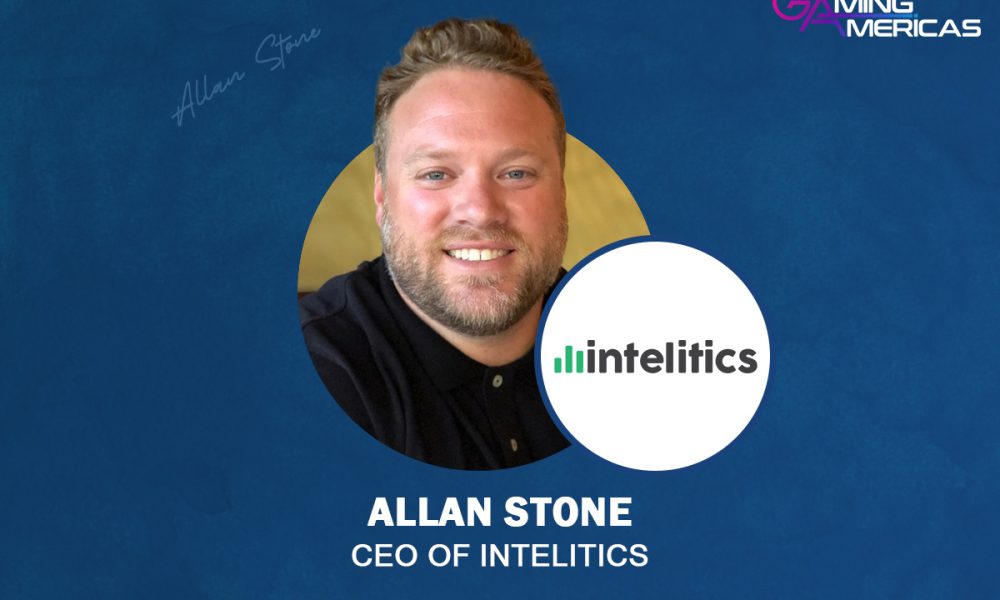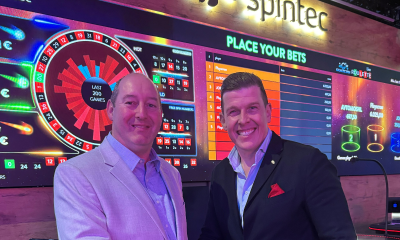Allan Stone CEO of Intelitics
Intelitics joins forces with StatMuse

Performance marketing and analytics platform provider selected by sports stats and information AI search provider as exclusive monetization partner in the US betting space
Intelitics, the leading performance marketing and analytics platform provider, has entered into a strategic partnership with StatMuse to become the artificial intelligence company’s exclusive monetization partner in the US and international betting space.
Under the partnership, Intelitics will manage all StatMuse betting-focused monetization by negotiating and managing relationships with operators via its Performance Marketing division. For Intelitics, the partnership provides an opportunity to cement Statmuse as a major partner to betting brands across the US, and globally. In addition, Intelitics CEO Allan Stone will be added to the StatMuse Advisory Board.
StatMuse, an artificial intelligence company backed by Disney and Google, is the leader in conversational search for sports stats and information. Its search platform provides instant answers to trillions of sports questions, turning every search result into a piece of personalized content.
After a year of hypergrowth, where the company experienced 225M+ organic search impressions despite a temporary shutdown of the sports industry, StatMuse is now looking to scale its monetization in the betting space. Intelitics will help StatMuse identify and secure premium and unique opportunities in regulated sports betting states, as well as US-wide for daily fantasy sports.
The deal bolsters Intelitics’ performance marketing business with additional growth expected over the coming months with more deals in the pipeline and further investment into its market-leading technology and platform.
Allan Stone, CEO of Intelitics, said: “This is a milestone deal for both parties. For StatMuse, it means the monetization of its traffic in the betting space for the first time now that they’ve reached significant scale, while for Intelitics it further strengthens our leading performance marketing division.
“Legal sports betting is growing at a rapid pace across the US and this deal will allow StatMuse to leverage and monetize its traffic through partnerships that maximize the value of their traffic. For us, it further positions Intelitics as the marketing partner of choice in the betting space.”
Eli Dawson, Co-founder & CEO of StatMuse, said: “After a banner last 12 months, we’ve emerged as the definitive leader in search for sports stats and information — our direct traffic to statmuse.com has reached global scale with weekly visitors from 200+ countries, our branded content is loved by both fans and stars alike, and our Sports Search API now powers stats and info for NBA, NFL and NHL teams. We’re excited for the next phase of the business as we begin to monetize our high volume and high value sports traffic, whilst legal sports betting continues its roll out across North America.
“Core to our strategy of decentralizing the company to maximize growth, Intelitics is the perfect monetization partner for our sports betting traffic, and we look forward to them negotiating and managing deals and partnerships that allow us to fully capitalize on the massive opportunity at hand.”
Powered by WPeMatico
Allan Stone CEO of Intelitics
Allan Stone: Player retention – keeping players coming back in the age of sky-high acquisition costs

In your view, why do you think player acquisition costs are reaching record-high levels?
Allan Stone: We’re starting to see the impact of many of the privacy standards implemented. There is the Cookie deprecation that’s happened across both Google and iOS, as well as a lot of the ad identifiers being blocked by default, as opposed to as a setting that users can turn on. Operators haven’t been able to truly understand what the impact of this has been. They’re having to spend much more to achieve the same level of performance, simply because they don’t have a good understanding of the systems in place to hone in on where they are spending money to acquire players. As a result, operators are having to spend more money acquiring players that maybe aren’t the best quality and will likely churn.
From a regulatory perspective, especially in the US, there has been a bit of a slowdown in markets opening. We had an initial gold rush here in the US, but now, fewer states are coming online. We’re seeing a pullback on ad spend; even though it costs much more to acquire new players, operators aren’t spending as much as they used to. I think that’s an effect of over saturation in the market. Players have seen all these different products and different brands that are available to them. Essentially, the core products have become very commodotised. Every operator seems to offer pretty much the same slots as everyone else does.
What’s interesting is that if you’re to walk into a bunch of different casinos in Las Vegas, once you walk past the front doors, they all look and feel the same from a gaming perspective. Where they differ is through the experience that you get while in the casino; the design, the hospitality, etc. Those players that tend to play offline are starting to look towards those secondary offerings outside the core betting portfolio, they’re seeking more of an experience.
I think that we haven’t seen that in the digital space yet. There is very little differentiation in user experience on one betting app compared to the others. Operators need to take the time and energy to really personalise and customise their user experience to individual players. When that starts to happen, this is when you start to see an increase in acquisition costs. But then you will also see a consolidation in those costs – operators will start to become more efficient, cost savings will come into play, and that is when these brands can really differentiate themselves from one another.
What’s the secret to keeping players coming back in the long term?
Allan Stone: In a word, personalisation. It’s plain and simple. The more that brands can understand player behaviours and continue to create personalised experiences, the more they will keep players coming back in the long term.
I’ve heard a few different product people talk about how they can try personalise the experience further, and one idea was to emulate the experience that you get from apps such as Tinder where you swipe left or right to bet on different markets. What they realised was that the younger generation of players – who maybe weren’t as valuable – enjoyed that product feature, but their core betting customers weren’t as engaged. Operators are waking up to that now. If you want players to remain around, you’ve got to give them a reason to stay other than simply rolling out the same products as everyone else.
For a lot of the North American brands, they’ve done a great job of tying their iGaming and sports betting experience into their land-based properties. As time goes on, and the market continues to mature, you’ll see much more of that starting to happen. The land-based and digital experiences can complement each other really well, when done right; operators need to make sure they have that streamlined experience across all touchpoints. Brands should be going beyond the standard, core betting experience and instead delivering something much more holistic, and much more personalised to each customer.
Historically, we’ve beta tested location-based suggestions during NFL games, whereby if someone opened up a betting app while in a stadium, then that would be a good indicator of what markets they would be looking to bet on. They’re more than likely wanting to bet on the game that is taking place in front of them. Operators could use this opportunity to offer micro betting markets, or player props to that player. We know that the technology is there to do this.
How do these approaches balance the need for immediate engagement with long-term loyalty?
Allan Stone: A lot of the data and technologies that exist to support operators from an AdTech and MarTech perspective, at least from an acquisition side, has not been great. But we are starting to see that change. Operators can no longer leverage 20-year-old technology to solve a modern-day problem. They need to get granular with the data that they have at their disposal and understand where they can improve their media buying efforts. They need to find out how many players they acquired, what their lifetime value is, whether there are any similarities and trends between those players. From there, operators can then optimise their campaigns to focus on just acquiring those players.
There is much more that operators can be doing to leverage their data at scale and create massive efficiencies in their player acquisition – that, ultimately, would bring down costs. If you can create those efficiencies, you can theoretically reduce your costs by 20-30% which is a huge saving.
-

 Amusnet6 days ago
Amusnet6 days agoWeek 7/2026 slot games releases
-

 Aphrodite’s Kiss6 days ago
Aphrodite’s Kiss6 days agoLove on the Reels: Slotland Introduces “Aphrodite’s Kiss”
-

 Brino Games6 days ago
Brino Games6 days agoQTech Games integrates more creative content from Brino Games
-

 Denmark7 days ago
Denmark7 days agoRoyalCasino Partners with ScatterKings for Company’s Danish Launch
-

 Baltics7 days ago
Baltics7 days agoEstonia to Reinstate 5.5% Online Gambling Tax From March 1
-

 Booming Games7 days ago
Booming Games7 days agoTreasure Hunt Revival — Booming Games Launches Gold Gold Gold Hold and Win
-

 Bet Rite7 days ago
Bet Rite7 days agoSpintec Expands into Canada with Bet Rite
-

 ELA Games7 days ago
ELA Games7 days agoELA Games Unveils Tea Party of Fortune — A Magical Multiplier Experience



















